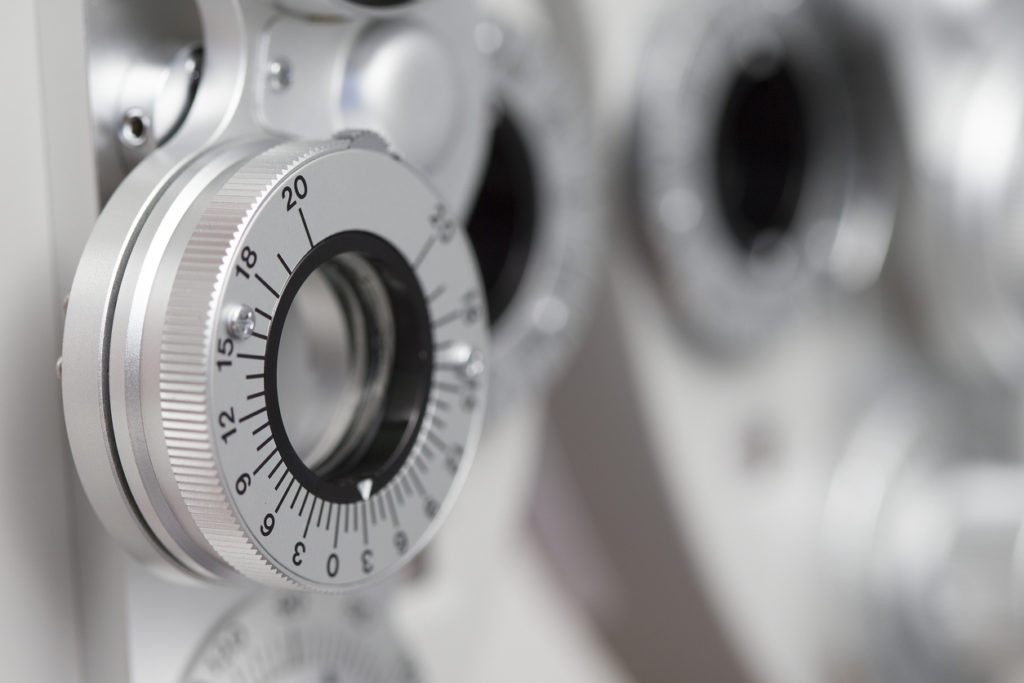How to choose an eye doctor
It may be human nature to surround ourselves with people who see things the way we do. But we should also include a few who see things a little differently. This applies especially to your eye doctor.
The person you choose to provide your annual eye exam should be as much an ally as an expert. Above all, he or she should be able to tell you what you need to know about your vision health — even when you don’t see it coming.
Eye care experts generally recommend a comprehensive eye exam every year or 2, depending on age or vision needs.1 And with roughly 60,000 optometrists and ophthalmologists operating in the U.S.,2 there are plenty of choices. Here are 6 considerations we recommend when deciding on the best eye doctor for you.
Get a read on your network
More than 87% of Americans with vision benefits intend to get eye exams within 12 months.3 Many carriers, including EyeMed, offer online portals that enable you to search by proximity, and get a feel for the mix of in-network independent and retail providers. Remember: Staying in-network translates to lower out-of-pocket costs — that means more money in your pocket.
Eye care professionals fall into three categories. Be sure to see the right one.
Optometrists are primary healthcare professionals for the eye. Doctors of Optometry examine, diagnose, treat and manage diseases, injuries and disorders of the visual system, the eye and associated structures as well as identify related systemic conditions affecting the eye.
Ophthalmologists are medical doctors, licensed to diagnose and treat all eye diseases, as well as perform surgery. Think about optometrists and ophthalmologists like your family doctor and a surgeon — except within the vision world, ophthalmology is a specialty within a specialty.
Opticians are technicians who fit frames and lenses that have been prescribed by an optometrist or ophthalmologist to correct the patient’s vision

How to Choose the Best Optometrist: Your Complete Guide
Struggling with your eyesight?
Need professional help to resolve the problem? Thankfully, you won’t have to look far. The United States is expected to have 46,000 optometrists working around the country by next year. That’s a lot of eye doctors to choose from.
Know the Different Professions
It’s worth noting the different eye-disciplines. You need to know you’re seeking the right support from the outset. The term ‘eye doctor’ gets thrown around a lot these days. But there are two distinctive professional fields to know about: optometrists and ophthalmologist. They definitely aren’t the same!
Seek Recommendations
Let’s assume you know you need to see an optometrist. The easiest step for finding one is often to seek direct referrals. Set about asking your friends, family members and colleagues for recommendations. Who do you know who relies upon glasses and regularly visits the eye doctor for support?
Look for Reviews
Think about your process of deciding somewhere new to eat. Finding a good restaurant can be hit and miss. That’s why sites like TripAdvisor were set up and quickly skyrocketed in popularity. They provide independent ratings and reviews by patrons that reveal a service’s quality.
Check That the Price is Right
Your ideal optometrist will fall within your price range. There’s no point going somewhere you can’t afford. Always finding out about charges prior to receiving treatment. You don’t want to have the examination, only to be surprised by a crippling invoice at the end.

Optometrist or Ophthalmologist: How to Choose the Right Eye Doctor
When it comes to eye problems, everyone knows that they need to consult with a specialist. Often the most confusing part is, which one do we go to? Whether it’s a routine check up, or experiencing vision problems, a simple online search can leave one scratching the head and staring at dozens of options ranging from optometrists to ophthalmologists.
Education
At the end of the day, a major chunk of the difference comes down to education. An optometrist is not a medical doctor. They receive a doctor of optometry (OD) degree upon completion of four years of optometry school, preceded by three years or more years of college.
Surgery
An optometrist cannot perform eye surgery. Being healthcare professionals, they can nevertheless provide basic eye care including sight testing, diagnosis, sight correction, treatment, and general ocular management. In fact, in some areas, optometrists can deliver better results such as prescribing contact and eyeglass lenses due to the extent of exposure they get vis-à-vis such cases.
Performing Research
This is another area of difference between optometrists and ophthalmologists. The former’s ability to perform research is restricted by their qualification.
How to choose the right eye doctor?
Your decision whether to consult an ophthalmologist or an optometrist may be influenced by many factors such as the severity of the visual distortion, budget constraints, incorrect diagnosis etc. What we need is a proper classification of preferences to ease out your decision of consulting either of the two professionals.

Choosing an Eye Doctor
Where do you go when you are having difficulty with your eyesight? Depending on the extent of the problem, your answer may vary. There are several different types of eye doctors and eye specialists you could see, including an ophthalmologist, optometrist, and optician.
What Is an Ophthalmologist?
Ophthalmologists are eye doctors that specialize in the medical and surgical care of the eyes and visual system, and also the prevention of eye disease and injury. They can be either doctors of medicine (MD) or doctors of osteopathy (DO).
While medical doctors focus on disease-specific diagnosis and treatment, osteopaths concentrate on the loss of structure and function in different parts of the body due to disease, including the eye. An eye doctor who is an osteopath would give treatment based on the assumption that treating the parts of the visual system with the use of medicines, surgery, diet, and other therapies, will therefore treat the underlying eye problem.
What Is an Optometrist?
Optometrists are eye doctors of optometry (OD). They are trained to examine, diagnose, treat, and manage some diseases and disorders of the eye and visual system. The optometrist has completed pre-professional undergraduate education and four years of professional education at an accredited college of optometry. In addition, some optometrists may have completed a one-year optional residency in a specialized area. Optometrists have not attended medical school.
What Is an Optician?
Opticians are eye healthcare professionals who work with ophthalmologists and optometrists to provide vision services related to the diagnosis and treatment of vision problems and eye disease. They assist optometrists and ophthalmologists in providing complete patient care before, during, and after exams, procedures, and surgeries. With a two-year technical degree, opticians analyze and interpret eye prescriptions; determine the lenses that best meet a persons needs; oversee ordering and verification of eye-related products from start to finish; dispense, replace, adjust, repair, and reproduce previously ordered contact lenses, eyeglasses, and frames.

Tips For Choosing The Best Eye Care Center For Your Family
Find a Local Eye Care Center
To get the obvious out of the way: it’s ruinous to drag your family to a faraway place for eye care. Few kids like car rides and every parent knows that if the kids aren’t happy, you’re not going to have a good time either. Plus, your entire family keeps a busy schedule. You don’t want to be tripping over yourselves trying to get from soccer practice and dance recitals to Buck’s Discount Care For Eyez on the outskirts of town or Big-Time Corporate Chain in the next town over. You want to be able to get the vision care you need quickly and easily, where you live. More importantly, you want to find an optometrist that cares about your community. You’ll get more personal and trusted treatment from a familiar face. That will help ease any fears in the family about going to the eye doctor and is a great way to support the community you’re a part of.
Ask if They Treat All Ages
Taking a child or a grandparent into an eye care center for their first exam is enough of an event. If the optometrist you’re seeing doesn’t have experience treating particular age groups, that can add undue pressure and result in some clumsy interactions and sub par treatment. Find out ahead of time whether the eye care center you’re considering has experience treating all ages. You want to find an optometrist that has seen it all and is equally comfortable treating a 4-year-old as they are treating an 80-year-old and every age in between. If you’re looking for a family vision care center, make sure that the entire family can find the treatment they need there. That will make eye doctor appointments easier on your family and will spare inexperienced optometrists the awkwardness.
Make Sure They’re Qualified
This tip can apply across the medical care spectrum. But, it’s important. Your family is what matters most. Ensure that you’re taking them to an eye care center with licensed, credentialed, and experienced optometrists. How long the vision center has been in business, how trusted it is within a community, and its experience treating patients should all be considered when choosing where to take your family for vision care. You want to find an optometrist that will be a resource for vision care throughout each family member’s life. That’s a tall task and not everyone will be up to it. Find eye doctors who want that life long relationship and have the skills to back it up.
Go Somewhere with Selection
After you receive top-flight medical care from an optometrist and they determine you need glasses or contacts, it’s a humongous benefit to be able to find what you need right in the same vision center. Opt for an eye care center that has an incredible selection of glasses (lenses and frames) for every need. Not only should you be able to order contacts from your vision care center, but you should also be able to find the perfect pair of glasses. Find an eye doctor that has brand names at competitive prices. A good selection will make it easy for each person in your family (who needs glasses) to find the pair that works for them! Think about the trouble saved when you’re able to knock out eye exams and find new glasses for everyone in the same place.
Examine The Mission
What is the Mission of the vision care center you’re looking into? Do they seem primarily concerned with cultivating lifelong eye care relationships with patients of all ages? Or, do they seem like they’re motivated by making money and taking on as many new patients as possible to grow profits? If it’s the latter, you have to ask yourself ‘Is this the right place for me and my family?’ Especially for younger children, it’s important to find an optometrist who will put them at ease and be a steady resource for all kinds of vision maintenance and improvement. An optometrist that can provide vision for life is invaluable to your family. Find an eye care center with values that match your own. It’s the groundwork for a successful and lasting eye care relationship.